I love books that stretch genre boundaries. Many of the novels I would name as personal favorites tend to fall into that narrow space between mainstream literary fiction and straight-up science fiction and fantasy. I enjoy the weird stuff: books that bend reality, that tamper with the world we recognize just enough to unseat our preconceptions of what might be possible. This seam of literature is rich in ideas and evocative language. Writers at the edge of genre are often more eager to take risks with literary form, or with styles of expression. Many of their books would undoubtedly find favor with the science fiction audience—if only SF readers knew they were out there. Writers such as David Mitchell, Kazuo Ishiguro, and Emily St. John Mandel have already won millions of fans among the SFF community, and luckily for all of us there are many more of these innovative “crossover” writers to discover.
Here are just five of them:
Find Me by Laura van den Berg
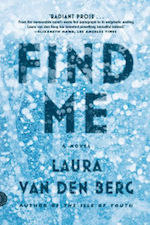 Laura Van Den Berg’s short stories have gained a lot of attention from mainstream literary critics, but her 2015 debut novel Find Me has travelled somewhat under the radar. The book’s main character, Joy, is very much the product of her unsettled upbringing. Addicted to over-the-counter medicines, fired from a job she hates, she is set up to fail. But when an unidentified pandemic sweeps across the United States, killing millions, Joy is identified as one of the few with a natural immunity to the disease. Find Me starts out reading like a typical post-apocalypse adventure. In fact it morphs into something very different and much more original. A personal odyssey across an America in crisis, Van Den Berg’s novel nonetheless manages to deliver a message of hope. The characters in this novel—Joy especially—are drawn with depth and sympathy, and Van Den Berg’s sensual, evocative writing makes this a science fiction novel of visionary wonder that demands—and deserves—your full attention.
Laura Van Den Berg’s short stories have gained a lot of attention from mainstream literary critics, but her 2015 debut novel Find Me has travelled somewhat under the radar. The book’s main character, Joy, is very much the product of her unsettled upbringing. Addicted to over-the-counter medicines, fired from a job she hates, she is set up to fail. But when an unidentified pandemic sweeps across the United States, killing millions, Joy is identified as one of the few with a natural immunity to the disease. Find Me starts out reading like a typical post-apocalypse adventure. In fact it morphs into something very different and much more original. A personal odyssey across an America in crisis, Van Den Berg’s novel nonetheless manages to deliver a message of hope. The characters in this novel—Joy especially—are drawn with depth and sympathy, and Van Den Berg’s sensual, evocative writing makes this a science fiction novel of visionary wonder that demands—and deserves—your full attention.
Familiar by J. Robert Lennon
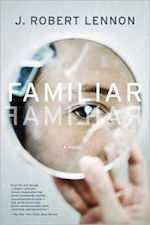 For anyone with an interest in edge-of-genre literature, J. Robert Lennon is a must-read. His 2009 novel Castle, about a disturbed war veteran and his descent into paranoid delusion, is a powerful narrative with strong parallels to Jennifer Egan’s equally compelling 2006 novel The Keep. But it is in his 2012 novel Familiar that Lennon strays closest to writing full-on science fiction. Elisa Brown is driving home from an annual pilgrimage to her son’s grave when her attention is caught by a crack in the windscreen of her car. She can’t remember noticing the crack before, or imagine how it came to be there. This is just the first in a series of escalating inconsistencies that bring Elisa finally to the realisation that she has somehow been transported into an alternate version of her own life—a version of her life in which her dead son is still alive. Lennon handles his speculative materials with deft precision, and also has much to say about society’s expectations of women and the often vexed relationships between people who, though they might be familiar with one another, nonetheless remain strangers. Lennon has a new novel out in 2017—Broken River—and needless to say I’m looking forward to it immensely.
For anyone with an interest in edge-of-genre literature, J. Robert Lennon is a must-read. His 2009 novel Castle, about a disturbed war veteran and his descent into paranoid delusion, is a powerful narrative with strong parallels to Jennifer Egan’s equally compelling 2006 novel The Keep. But it is in his 2012 novel Familiar that Lennon strays closest to writing full-on science fiction. Elisa Brown is driving home from an annual pilgrimage to her son’s grave when her attention is caught by a crack in the windscreen of her car. She can’t remember noticing the crack before, or imagine how it came to be there. This is just the first in a series of escalating inconsistencies that bring Elisa finally to the realisation that she has somehow been transported into an alternate version of her own life—a version of her life in which her dead son is still alive. Lennon handles his speculative materials with deft precision, and also has much to say about society’s expectations of women and the often vexed relationships between people who, though they might be familiar with one another, nonetheless remain strangers. Lennon has a new novel out in 2017—Broken River—and needless to say I’m looking forward to it immensely.
The People in the Trees by Hanya Yanagihara
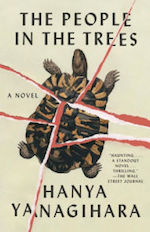 It would have been hard to miss the buzz surrounding Yanagihara’s bestselling 2015 novel A Little Life, which was shortlisted for the Booker Prize and the Bailey’s Prize, and a finalist for the National Book Award. Much less noise was made about her 2013 debut, The People in the Trees, though to my mind at least it is the superior novel. The People in the Trees is a dark book but an important one. Narrated by Nobel Laureate Dr. Norton Perina, it tells the story of a team of anthropologists and their journey to the hitherto unexplored island of Ivu’ivu. There is a legend among the island’s native people about a lost tribe known as “the Dreamers” who are said to be immortal, a legend Perina becomes obsessed with investigating. Perina is ruthless in pursuit of his goals—and not just his scientific ones. (Be warned: this novel contains material relating to child sexual abuse.) But Perina is not the only problem, and if The People in the Trees has a core concern it is the incalculable damage that is routinely done to native communities by Western invaders in the name of “progress.” This novel is a speculative tour de force: controlled, precise, stunningly visual and featuring one of the most sinister unreliable narrators since Nabokov’s Humbert Humbert.
It would have been hard to miss the buzz surrounding Yanagihara’s bestselling 2015 novel A Little Life, which was shortlisted for the Booker Prize and the Bailey’s Prize, and a finalist for the National Book Award. Much less noise was made about her 2013 debut, The People in the Trees, though to my mind at least it is the superior novel. The People in the Trees is a dark book but an important one. Narrated by Nobel Laureate Dr. Norton Perina, it tells the story of a team of anthropologists and their journey to the hitherto unexplored island of Ivu’ivu. There is a legend among the island’s native people about a lost tribe known as “the Dreamers” who are said to be immortal, a legend Perina becomes obsessed with investigating. Perina is ruthless in pursuit of his goals—and not just his scientific ones. (Be warned: this novel contains material relating to child sexual abuse.) But Perina is not the only problem, and if The People in the Trees has a core concern it is the incalculable damage that is routinely done to native communities by Western invaders in the name of “progress.” This novel is a speculative tour de force: controlled, precise, stunningly visual and featuring one of the most sinister unreliable narrators since Nabokov’s Humbert Humbert.
The Falling Sky by Pippa Goldschmidt
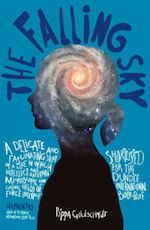 Runner-up in the Dundee International Book Prize 2012, this small gem of a novel contains only a modest element of speculation, but its firm foundations in practical science, its preoccupation with the quest for knowledge, and its bravery in confronting issues of alienation and sexism within the citadels of academia make it instantly accessible and important for science fiction readers. Jeanette is a research astronomer who believes she has made a discovery that could challenge the whole of current Big Bang theory. Her male colleagues quickly close ranks against her, leaving her isolated and increasingly vulnerable to the encroaching pressures of her troubled private life. The Falling Sky is a quiet book with a powerful impact, close in its focus but massive in its implications. The writing—understated but flawlessly crafted—provides a vibrant echo of its textual concerns. It is marvellous to see a female protagonist—and a queer female protagonist at that—placed firmly at the centre of a science-based narrative in such a matter-of-fact way. Alastair Reynolds has described The Falling Sky as “the best evocation of the actual life of an astronomer I’ve ever read,” which is possibly the highest commendation this book could receive.
Runner-up in the Dundee International Book Prize 2012, this small gem of a novel contains only a modest element of speculation, but its firm foundations in practical science, its preoccupation with the quest for knowledge, and its bravery in confronting issues of alienation and sexism within the citadels of academia make it instantly accessible and important for science fiction readers. Jeanette is a research astronomer who believes she has made a discovery that could challenge the whole of current Big Bang theory. Her male colleagues quickly close ranks against her, leaving her isolated and increasingly vulnerable to the encroaching pressures of her troubled private life. The Falling Sky is a quiet book with a powerful impact, close in its focus but massive in its implications. The writing—understated but flawlessly crafted—provides a vibrant echo of its textual concerns. It is marvellous to see a female protagonist—and a queer female protagonist at that—placed firmly at the centre of a science-based narrative in such a matter-of-fact way. Alastair Reynolds has described The Falling Sky as “the best evocation of the actual life of an astronomer I’ve ever read,” which is possibly the highest commendation this book could receive.
Communion Town by Sam Thompson
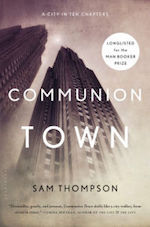 A novel in the form of ten interlinked short stories, Communion Town was longlisted for the 2012 Man Booker Prize, but did not receive as much attention as it might have done from the SFF community. The jacket blurb describes the novel as “a city in ten chapters,” and indeed it is the city—Communion Town itself—that is the central character here, as limpidly elusive as Calvino’s Venice, as dangerous and as mutable as Miéville’s New Crobuzon or Beszel/Ul Qoma. Travelling through the backstreets and obscure quarters of this bizarre metropolis, we catch glimpses of monsters and ghosts, maverick detectives, political asylum seekers and serial killers. Thompson is a master of language, and in this virtuoso literary tribute to the masters of weird fiction, his love for genre literature couldn’t be clearer. Communion Town is compulsively readable, a dark fantasy classic in the making.
A novel in the form of ten interlinked short stories, Communion Town was longlisted for the 2012 Man Booker Prize, but did not receive as much attention as it might have done from the SFF community. The jacket blurb describes the novel as “a city in ten chapters,” and indeed it is the city—Communion Town itself—that is the central character here, as limpidly elusive as Calvino’s Venice, as dangerous and as mutable as Miéville’s New Crobuzon or Beszel/Ul Qoma. Travelling through the backstreets and obscure quarters of this bizarre metropolis, we catch glimpses of monsters and ghosts, maverick detectives, political asylum seekers and serial killers. Thompson is a master of language, and in this virtuoso literary tribute to the masters of weird fiction, his love for genre literature couldn’t be clearer. Communion Town is compulsively readable, a dark fantasy classic in the making.
 Nina Allan has won the BSFA Award for Short Fiction, the prestigious Grand Prix de l’Imaginaire, and the Aeon Award. She has been shortlisted for the British Fantasy Award four times and was a finalist for the 2014 Shirley Jackson Award. The Race is her first novel.
Nina Allan has won the BSFA Award for Short Fiction, the prestigious Grand Prix de l’Imaginaire, and the Aeon Award. She has been shortlisted for the British Fantasy Award four times and was a finalist for the 2014 Shirley Jackson Award. The Race is her first novel.










